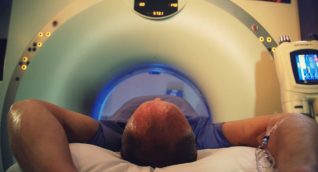Contrast or “dye” is sometimes used to improve the detail seen in CT scan imaging, which uses X-rays to create a visualization of the inside of your body. Like bones, contrast material blocks X-rays and appears white on images. The use of contrast allows radiologists to better examine blood vessels, internal organs, and other structures.
Contrast may be taken as liquid you drink, administered as an enema, or given intravenously (IV). Very rarely, some patients have negative or allergic reactions when receiving contrast.
- Oral contrast (by mouth) – For CT scan of the pharynx (throat), esophagus, stomach, or intestines you may need to swallow liquid contrast material. This drink has a chalky taste but is not unpleasant to most people.
- Intravenous (IV) contrast – To help radiologists see certain organs or blood vessels in more detail, you may be given IV contrast through a vein in your hand or arm. During the injection, you may feel a sensation of warmth, a metallic taste in your mouth or the urge to urinate. These symptoms are temporary and usually go away quickly.
- Enema – Contrast material may be inserted into your rectum to help visualize your rectum or colon (large intestine). This can be uncomfortable and make you feel bloated.
Even though side effects have been reported when using CT scan contrast, the overall risk is very low. Your paramedic or technologist is fully trained to address any side effects or allergic reactions. If symptoms are severe, you can be quickly transferred to a place where you can receive emergency care. Talk to your medical provider about the risks of CT contrast. If your physician recommends a CT scan, it’s because the potential benefits (diagnosing or detecting disease) far outweigh the risk of side effects.
But rarely, barium sulfate may cause side effects. Make sure you tell your medical provider or technologist if you have stomach cramps, diarrhea, nausea, vomiting, or constipation. In rare cases, barium sulfate can cause more serious side effects. Tell your doctor immediately if you have hives, itching, red skin, throat swelling, trouble breathing/swallowing, hoarseness, agitation, fast heartbeat, or blue skin discoloration.
Rarely, iodine-based contrast material may cause nausea, vomiting, headache, itching, flushing, skin rash, or hives. More severe reactions are very rare and may include severe rash, breathing difficulty, abnormal heart rhythm, blood pressure abnormality, body swelling, convulsions, or cardiac arrest. Please tell your technologist if you experience any of these symptoms. ARA medical personnel are well-trained in how to handle allergic reactions.
If you are to undergo a CT scan with contrast, be sure to inform your physician of all medications and allergies you may have. If you have a known allergy to contrast material, make sure you inform your medical provider before scheduling your CT scan. You may be instructed to take medication (usually a steroid) up to 12 hours before the test to reduce the risk of an allergic reaction.
Inform your radiologist about any chronic medical conditions or recent illness, especially if you have a history of heart disease, asthma, diabetes, kidney disease, sickle cell anemia, or thyroid problems. If you have significant kidney disease or renal dysfunction, you may not be able to receive IV contrast. Discuss these issues with your medical provider; an alternative test or CT without contrast may be recommended.
If you have kidney (renal) disease or dysfunction, you may be at higher risk for contrast-induced nephropathy (CIN). This condition occurs in patients with preexisting kidney disease that gets worse after receiving iodine-based contrast. Most cases of CIN appear to have occurred with older contrast material. Some recent studies have not found an increased risk of CIN due to iodine-based contrast. If you have impaired kidney/renal function, make sure to discuss the risks of receiving contrast with your medical provider.
The American College of Radiology (ACR) says that current information suggests that breastfeeding is safe after the use of intravenous contrast. Please discuss your breastfeeding options with your physician.

